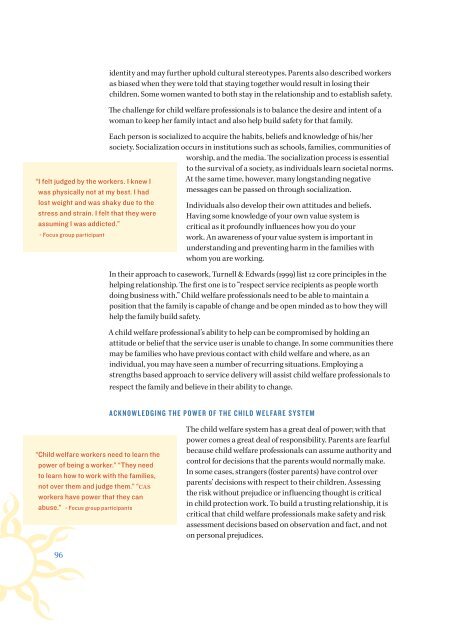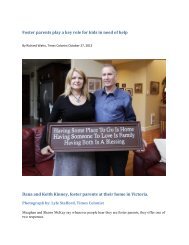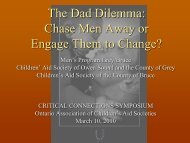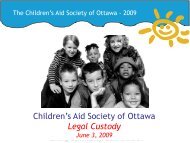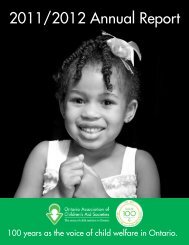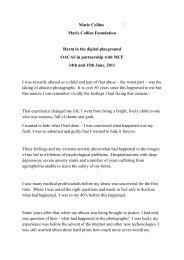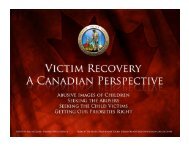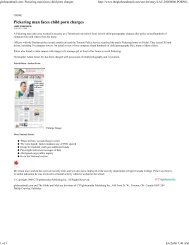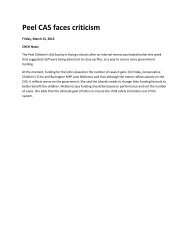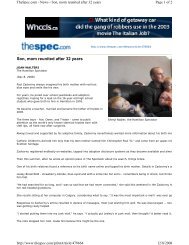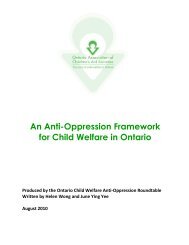English - Ontario Association of Children's Aid Societies
English - Ontario Association of Children's Aid Societies
English - Ontario Association of Children's Aid Societies
You also want an ePaper? Increase the reach of your titles
YUMPU automatically turns print PDFs into web optimized ePapers that Google loves.
“I felt judged by the workers. I knew I<br />
was physically not at my best. I had<br />
lost weight and was shaky due to the<br />
stress and strain. I felt that they were<br />
assuming I was addicted.”<br />
- Focus group participant<br />
identity and may further uphold cultural stereotypes. Parents also described workers<br />
as biased when they were told that staying together would result in losing their<br />
children. Some women wanted to both stay in the relationship and to establish safety.<br />
The challenge for child welfare pr<strong>of</strong>essionals is to balance the desire and intent <strong>of</strong> a<br />
woman to keep her family intact and also help build safety for that family.<br />
Each person is socialized to acquire the habits, beliefs and knowledge <strong>of</strong> his/her<br />
society. Socialization occurs in institutions such as schools, families, communities <strong>of</strong><br />
worship, and the media. The socialization process is essential<br />
to the survival <strong>of</strong> a society, as individuals learn societal norms.<br />
At the same time, however, many longstanding negative<br />
messages can be passed on through socialization.<br />
Individuals also develop their own attitudes and beliefs.<br />
Having some knowledge <strong>of</strong> your own value system is<br />
critical as it pr<strong>of</strong>oundly influences how you do your<br />
work. An awareness <strong>of</strong> your value system is important in<br />
understanding and preventing harm in the families with<br />
whom you are working.<br />
In their approach to casework, Turnell & Edwards (1999) list 12 core principles in the<br />
helping relationship. The first one is to “respect service recipients as people worth<br />
doing business with.” Child welfare pr<strong>of</strong>essionals need to be able to maintain a<br />
position that the family is capable <strong>of</strong> change and be open minded as to how they will<br />
help the family build safety.<br />
A child welfare pr<strong>of</strong>essional’s ability to help can be compromised by holding an<br />
attitude or belief that the service user is unable to change. In some communities there<br />
may be families who have previous contact with child welfare and where, as an<br />
individual, you may have seen a number <strong>of</strong> recurring situations. Employing a<br />
strengths based approach to service delivery will assist child welfare pr<strong>of</strong>essionals to<br />
respect the family and believe in their ability to change.<br />
ACKNOWLEDGING THE POWER OF THE CHILD WELFARE SYSTEM<br />
“Child welfare workers need to learn the<br />
power <strong>of</strong> being a worker.” “They need<br />
to learn how to work with the families,<br />
not over them and judge them.” “CAS<br />
workers have power that they can<br />
abuse.” - Focus group participants<br />
The child welfare system has a great deal <strong>of</strong> power; with that<br />
power comes a great deal <strong>of</strong> responsibility. Parents are fearful<br />
because child welfare pr<strong>of</strong>essionals can assume authority and<br />
control for decisions that the parents would normally make.<br />
In some cases, strangers (foster parents) have control over<br />
parents’ decisions with respect to their children. Assessing<br />
the risk without prejudice or influencing thought is critical<br />
in child protection work. To build a trusting relationship, it is<br />
critical that child welfare pr<strong>of</strong>essionals make safety and risk<br />
assessment decisions based on observation and fact, and not<br />
on personal prejudices.<br />
96


